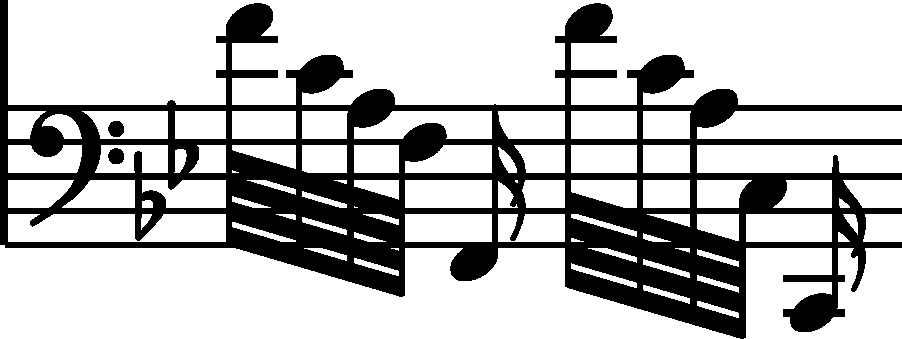



Pitch
|
b. 4
|
composition: Op. 2, Variation IV, primitive version
..
This bar belongs to one of the few places in which Chopin, while working on this variation, changed the shape of the melody formed by the R.H. topmost notes (see also bars 11 and 24). The interpretation of the AsI notation presents some difficulties, since it is uncertain whether the 3 grace notes, which could have been added later, were supposed to complement the figuration or whether they were an original way to mark the change of concept of the topmost notes to the final version. The latter is supported by analogous bar 20, in which AsI includes the final version entered without hesitation. In either case, the notation of these grace notes is puzzling, since each is provided with a different form: a semiquaver, a slashed quaver, a quaver, respectively. Perhaps Chopin wanted to try out different forms of notation to see which one would suit him best. category imprint: Interpretations within context; Differences between sources; Corrections & alterations issues: Terzverschreibung error , Errors in the number of ledger lines , Accompaniment changes , Main-line changes |
||||||||||
|
b. 4
|
composition: Op. 2, Variation IV, primitive version
..
In the main text we add a cautionary category imprint: Editorial revisions; Source & stylistic information issues: Cautionary accidentals |
||||||||||
|
b. 4
|
composition: Op. 2, Variation IV, primitive version
..
Chopin was gradually reaching the satisfying pitch of the three topmost notes in the 2nd and 4th L.H. figures. In this bar, both AsI figures differ from the A version, but in analogous bar 20 it is only the 4th figure that is different, and the 2nd figure is identical in both manuscripts. category imprint: Differences between sources; Corrections & alterations issues: Accompaniment changes |
||||||||||
|
b. 6
|
composition: Op. 2, Variation IV, primitive version
..
When writing the melody semiquavers without an octave sign, Chopin committed 14 mistakes in the entire variation, including 6 Terzverschreibung mistakes, which in this context consist in writing one ledger line too many. The list below shows the mistakes:
The letter names of notes written over the notes allow us to easily detect these mistakes. category imprint: Interpretations within context; Differences between sources; Source & stylistic information issues: Terzverschreibung error , Errors in the number of ledger lines |
||||||||||
|
b. 7
|
composition: Op. 2, Variation IV, primitive version
..
In the 1st half of the bar, the L.H. part bears traces of corrections in AsI. While working on this manuscript, the initial version: category imprint: Differences between sources; Corrections & alterations issues: Chopin's hesitations , Accompaniment changes , Corrections of AI |

 4, d4, c4 in
4, d4, c4 in  to e
to e was ultimately replaced by the one we give in our transcription. Chopin then once more changed the 2nd and 3rd hemidemisemiquavers in the 1st figure of the bar; in
was ultimately replaced by the one we give in our transcription. Chopin then once more changed the 2nd and 3rd hemidemisemiquavers in the 1st figure of the bar; in